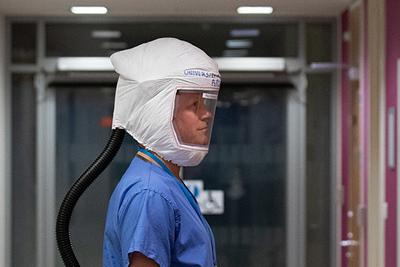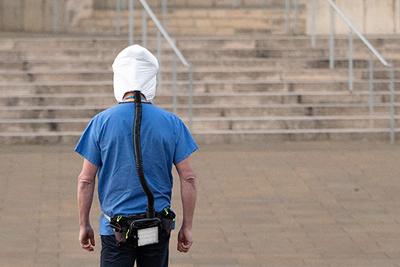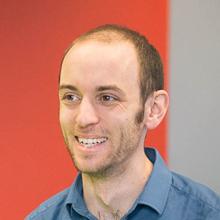Personal respirators rapidly developed for coronavirus healthcare workers

Researchers from the University of Southampton are trialling a prototype for a lightweight personal respirator that could soon be used to protect frontline healthcare staff tackling the COVID-19 pandemic.
An engineering team is working with medical staff, electronics experts and industry partners on the small portable unit consisting of a fabric hood which covers the wearer’s head and a plastic visor.
The PeRSo protective equipment, which was accelerated to an early stage prototype within a week, delivers clean air through a High Efficiency Particulate Air (HEPA) filter and a belt-mounted fan pack.
Doctors and nurses are testing the prototypes on the wards this week, with plans to obtain necessary safety certifications and publish the concept open-source so it would be available around the world.
Dr Alex Dickinson, of the Bioengineering Science Research Group, says: “An estimated 20% of Italian healthcare workers have become infected during the COVID-19 pandemic. We want to do what we can to help keep our healthcare workers safe, healthy and able to remain caring for patients.
“Currently, healthcare workers are using face masks. These may be uncomfortable over long periods, and not available everywhere. The need for respirators to protect our medical staff may be as big as the need for ventilators.
“Most masks don’t protect the eyes, and many available powered air purifying respirators are expensive or uncomfortable to wear for long periods, heavy and contain a loud fan - so we have developed a lower-cost prototype. Our prototype was designed for rapid production using low cost, off-the-shelf parts where possible, and several new components.”
The multi-disciplinary team, led by Professor Paul Elkington and Professor Hywel Morgan, includes Southampton engineers Mark Mavrogordato, Antonio De Grazia and Sebastian Rosini. Dan Spencer, Ric Gillams and Roeland Mingels have provided support from Electronics and Computer Science, while Alex Mant and Diana Garay Baquero have added their expertise from the Institute for Life Sciences and Biomedical Science.
Professor Hywel Morgan, of Electronics and Computer Science, says: “This is an excellent example of industry, universities and hospitals combining their expertise and answering the call to develop solutions needed to save lives in the current crisis.
“We are really grateful to our partners at McLaren, Kemp Sails and INDO on behalf of Baynhams for their commitment in working around the clock with us to getting this from a concept to a working prototype in a matter of days.”

The PeRSo prototype is designed to be lightweight and quiet, with the fan operating far away from the user’s head.
Professor Paul Elkington, of the Clinical and Experimental Sciences research group, said: “The engineering team have rapidly developed something simple yet effective. The HEPA filtered air removes 99.95% of particulate matter and the face mask protects from splashes, and so we think this will reduce the risk of infection.”
The team is now embarking on the next stage of the project which is investigating developing simpler prototypes using only components and materials available in developing countries.
